
by Pigeon Patrol | Dec 28, 2013 | 4-S Gel Bird repellent, Bird Deterrent Products, Pigeon Spikes, Pigeons in the News
 ANIMAL charities have reacted furiously over plans to slaughter Mottingham station’s pigeon population which have been persistently pooing on commuters.
ANIMAL charities have reacted furiously over plans to slaughter Mottingham station’s pigeon population which have been persistently pooing on commuters.
It comes after a station platform vendor says the birds are ruining her trade as customers dodge the birds’ bombs which have landed in cups of coffee and pose a health and safety risk.
Southeastern, which is responsible for cleaning the platforms, are planning a cull to get rid of the pigeons before fitting meshing to prevent any more roosting.
But animal charities say the move is “cruel” “unnecessary” and likely to worsen the problem which could be avoided by using non-lethal deterrents such as anti-perching spikes.
Speaking of the ongoing problem, owner of Shell’s Kiosk Michelle Hill, said: “I am losing customers.
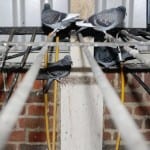 “Three people got pooed on this morning. “It is getting beyond a joke now. “It is like they are having a party up on the roof.”
“Three people got pooed on this morning. “It is getting beyond a joke now. “It is like they are having a party up on the roof.”
Officer Diane Roberts added: “The RSPCA is opposed to the killing of wildlife where it is possible to humanely deter them instead.
A Southeastern spokeswoman said: “Pigeons nesting at the station are making a huge mess and are an issue for customers, tenants and staff. Our priority is to provide a clean environment for our passengers and the businesses at the station.”
Pigeon Patrol would try the following bird deterrents – Anti-roosting spikes or bird spikes or pigeon spikes – Bird netting – 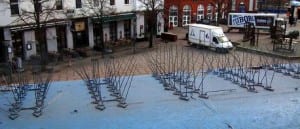 UltraSonic and Sonic devices and 4-S gel. Good luck on your bird control and your pigeon problems.
UltraSonic and Sonic devices and 4-S gel. Good luck on your bird control and your pigeon problems.
For the full story click the link below:
http://www.thisislocallondon.co.uk/news/10880484.Mottingham_rail_station_s_pooing_pigeon_cull_is__cruel__and__pointless_/
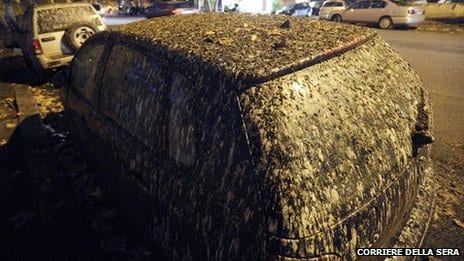
by Pigeon Patrol | Dec 28, 2013 | Bird Deterrent Products, Pigeon Spikes, Pigeons in the News, UltraSonic Bird Control
 Pigeon Patrol found this story in about, Rome facing a “guano alarm” as millions of pigeons and starlings leave the city covered in a thick layer of droppings, Italian media report.
Pigeon Patrol found this story in about, Rome facing a “guano alarm” as millions of pigeons and starlings leave the city covered in a thick layer of droppings, Italian media report.
Some four million birds annually overwinter in the capital, but this year spending cuts have derailed efforts to discourage the birds from settling in central areas. In previous years, anti-bird measures have included pruning plane trees and broadcasting amplified cries of birds of prey through loudspeakers.
But such efforts have not been put into action in 2013, so the birds have deposited a thick layer of droppings on streets, vehicles and buildings.
The tree-lined Lungotevere, the boulevard running along the river Tiber, is particularly badly affected. Sections of it are thick with droppings, creating slip hazards for pedestrians, cyclists and motorbike riders alike. Photos published by Corriere della Sera show vehicles blanketed with guano. Pedestrians arm themselves with umbrellas or run for cover. The situation is so bad that some residents bang on pots and pans in the streets and squares to scare the birds away, just as people used to do in years gone by.
Using bird spikes or pigeon spikes together with an UltraSonic bird deterrent would definitely help with Rome’s bird issue. Pigeon problems have not got this bad in Canada, but you never know. Canadians may have to pigeon proof with bird deterrents to get rid of their pigeon problem.
For the full story click the link below:
http://www.bbc.co.uk/news/blogs-news-from-elsewhere-24939386
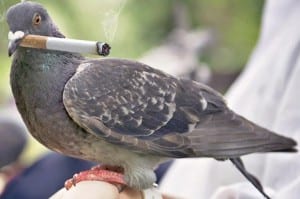
by Pigeon Patrol | Dec 27, 2013 | Pigeon Patrol's Services, Pigeons in the News, UltraSonic Bird Control
 This is a first for the Pigeon Patrol Products & Service crew to read up on.One nicotine-addicted bird sparked a major house fire when it dropped a lit cigarette butt down a chimney.
This is a first for the Pigeon Patrol Products & Service crew to read up on.One nicotine-addicted bird sparked a major house fire when it dropped a lit cigarette butt down a chimney.
The ciggie-loving sky rat topped the list of most bizarre causes of blazes this year according to Britain’s biggest fire brigade.
Investigators in London studied 2,000 incidents in the capital in a bid to highlight the importance of fire safety.
And their survey uncovered an incredible variety of “weird and wonderful” firestarters.
- A dog hit the controls of a toaster as it leapt on to a worktop to reach food, setting fire to a bag.
- A pigeon dropped a discarded lit cigarette down a chimney, starting a fire in a bird’s nest.
- A fridge freezer caught fire after a mouse got into the back, shorting the electrics.
Charlie Pugsley, of London Fire Brigade’s investigations team, said even the strangest fires could be prevented by taking simple fire safety precautions.
Having bird netting, bird spikes or pigeon spikes, 4-S gel or even an UltraSonic units that can be purchased from Pigeon Patrol could have help prevent this bizarre fire. Pigeon Patrol is based in North America and can be reached toll free at 1-877-4NO- BIRD.
To read the full story click on the link below:
http://www.dailystar.co.uk/news/latest-news/357638/Smoking-pigeons-dogs-using-toasters-and-flaming-underpants-are-top-fire-hazards

by Pigeon Patrol | Dec 27, 2013 | Bird Netting, Pigeon Patrol's Services, Pigeon Spikes, Pigeons in the News, UltraSonic Bird Control
Take over two hundred man hours to install pigeon netting or bird netting, a few more for the bird spikes or pigeon spikes and then add in an Ultrasonic sound unit or Bird repeller and you have one clean tourist attraction.
Pigeon Patrol Products and Services was proud to help Vancouver’s BC Place with their pigeon problem.





by Pigeon Patrol | Dec 26, 2013 | Pigeon Patrol's Services, Pigeon Spikes, Pigeons in the News
|
|
 Histoplasmosis Histoplasmosis
Histoplasmosis is a disease caused by a fungus, which grows in pigeon droppings. It also grows in soils and is found throughout the world. When cleaning droppings a person may breathe in some of the fungus, which in cases of high exposure can cause infection. Common activities, such as cleaning off windowsills, will not result in high exposures.
Symptoms of histoplasmosis begin to appear about 10 days after initial infection and include fatigue, fever, and chest pains. Most people, however, do not show any symptoms. Those with compromised immune systems such as cancer patients or people living with HIV/AIDS are generally more at risk of developing histoplasmosis. The disease cannot be transmitted from person to person.
Cryptococcosis
Cryptococcosis is another fungal disease associated with pigeon droppings and also grows in soils throughout the world. It is very unlikely that healthy people will become infected even at high levels of exposure. A major risk factor for infection is a compromised immune system. According to the US Centers for Disease Control (CDC), nearly 85 percent of cryptococcosis patients are HIV-positive.
Psittacosis
Psittacosis (also known as ornithosis or parrot fever) is a rare infectious disease that mainly affects parrots and parrot-like birds such as cockatiels, and parakeets, but may also affect other birds, such as pigeons. When bird droppings dry and become airborne people may inhale them and get sick.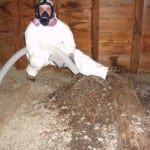
In humans, this bacterial disease is characterized by: fatigue, fever, headache, rash, chills, and sometimes pneumonia. Symptoms develop about 10 days after exposure. Psittacosis can be treated with a common antibiotic.
Since 1996, fewer than 50 confirmed cases were reported in the United States annually. In New York City, psittacosis is very rare with less than one human case identified each year. According to the CDC, about 70% of infected people had contact with infected pet birds. Those at greatest risk include bird owners, pet shop employees, veterinarians, and people with compromised immune systems. No person-to-person cases have ever been reported.
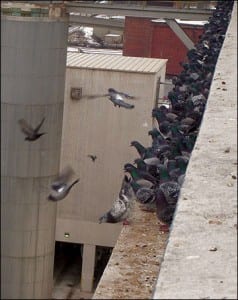
Amount of waste that the average pigeon produces each year: 25 pounds !! Source: New Yorker,2007
Estimate of the number of pigeons in New York City: 1,000,000 !! Source: New York Daily, 2007
Amount the average pigeon produces annually in droppings: 25 lbs. Source: New Yorker,2007
|
|

 ANIMAL charities have reacted furiously over plans to slaughter Mottingham station’s pigeon population which have been persistently pooing on commuters.
ANIMAL charities have reacted furiously over plans to slaughter Mottingham station’s pigeon population which have been persistently pooing on commuters. “Three people got pooed on this morning. “It is getting beyond a joke now. “It is like they are having a party up on the roof.”
“Three people got pooed on this morning. “It is getting beyond a joke now. “It is like they are having a party up on the roof.” UltraSonic and Sonic devices and 4-S gel. Good luck on your bird control and your pigeon problems.
UltraSonic and Sonic devices and 4-S gel. Good luck on your bird control and your pigeon problems.

 Pigeon Patrol found this story in about, Rome facing a “guano alarm” as millions of pigeons and starlings leave the city covered in a thick layer of droppings, Italian media report.
Pigeon Patrol found this story in about, Rome facing a “guano alarm” as millions of pigeons and starlings leave the city covered in a thick layer of droppings, Italian media report.
 This is a first for the Pigeon Patrol Products & Service crew to read up on.One nicotine-addicted bird sparked a major house fire when it dropped a lit cigarette butt down a chimney.
This is a first for the Pigeon Patrol Products & Service crew to read up on.One nicotine-addicted bird sparked a major house fire when it dropped a lit cigarette butt down a chimney.






 Histoplasmosis
Histoplasmosis
